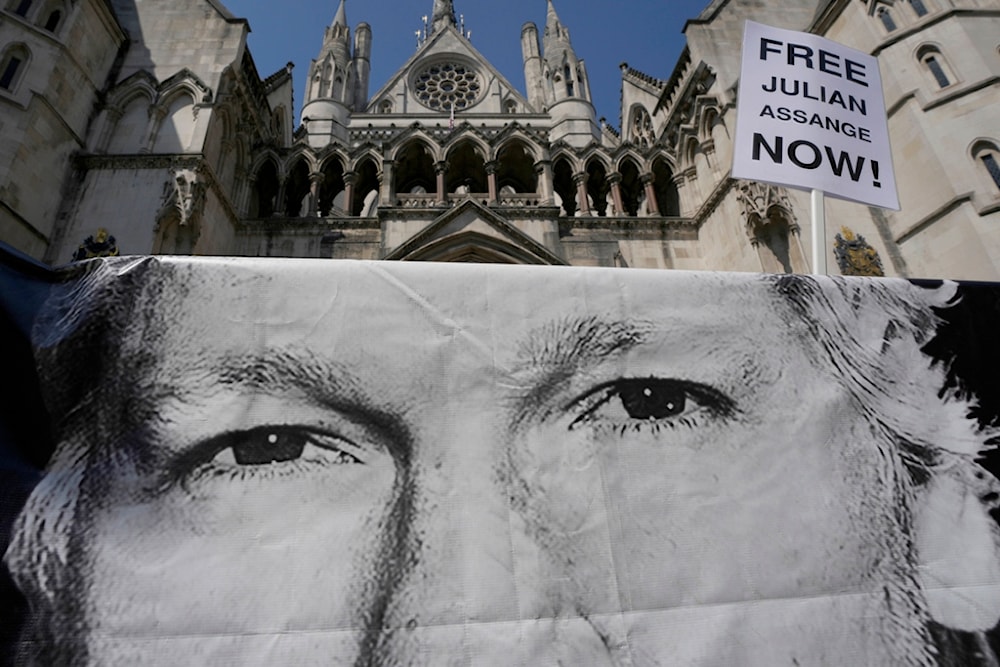Crucial evidence missing in Assange spying case: Spanish media
UC Global SL is accused of abusing its position by installing covert recording devices in the Ecuadorian embassy in London and relaying confidential information about Assange to the CIA. But a crucial piece of evidence holding audio recordings is now missing.
-

A poster of Julian Assange is left by protesters outside the High Court in London, Monday, May 20, 2024. (AP)
The case in Spain against defendant David Morales, whose firm allegedly spied on Julian Assange for the US government, has encountered a significant obstacle due to the reported disappearance of crucial evidence, the Spanish El Pais newspaper reported.
Morales is the owner of UC Global SL, a company hired to provide security at the Ecuadorian Embassy in London, where the Australian co-founder of WikiLeaks resided from 2012 to 2019.
UC Global SL is accused of abusing its position by installing covert recording devices in the embassy and relaying confidential information about Assange and his meetings to the Central Intelligence Agency (CIA). El Pais uncovered this arrangement in 2019, leading to Morales' arrest.
The newspaper on Wednesday reported that Spanish police had failed to supply complete files from a Samsung phone that Morales allegedly used to communicate with American intelligence. The missing data includes records of communications via WhatsApp, Signal, Telegram, Proton Mail, and Skype.
Cybercrime Unit ordered to recover data
The device was seized during a police search of Morales' home in Jerez de la Frontera in September 2019, with its contents supposedly copied at that time.
However, according to El Pais, police provided the Spanish High Court with a derivative Universal Forensic Data Report (UFDR) from the device but not the complete original Universal Forensic Data Exchange (UFDX).
In response, the public prosecutor’s office said that "it is extremely striking that the police unit has delivered the UFDR and UFDX files from the other devices and has not done so precisely from this one."
Judge Santiago Pedraz has instructed the police Cybercrime Unit to immediately recover the complete data from the phone in his presence and determine who was responsible for the missing information. Spanish authorities understand the significance of the phone records, thanks to a protected witness who is a former employee of UC Global SL.
Facing 175 years in prison
Julian Assange sought refuge at the Ecuadorian Embassy in 2012 after skipping bail in the UK to avoid extradition to Sweden, where he faced accusations of sexual assault that were eventually dropped. He argued that the extradition request from Stockholm was part of a ploy to transfer him to the US, where he could face the death penalty on espionage charges related to his work with WikiLeaks.
US authorities want to put Assange on trial for publishing US military secrets and evidence of war crimes in the wars in Iraq and Afghanistan. He is accused of publishing some 700,000 confidential documents relating to US military and diplomatic activities, starting in 2010.
The United States has accused Assange under the 1917 Espionage Act, which his supporters warn means he could be sentenced to 175 years in prison.
In 2019, following a change in the Ecuadorian government, British police were allowed to enter the embassy and arrest Assange. He has since been contesting a US extradition request in British courts while being detained in the high-security Belmarsh prison in London since April 2019.
Assange's appeal against a UK court ruling that approved his extradition to the United States to face trial will begin on July 9. In February, Australian Prime Minister Anthony Albanese underlined that it was time that Assange "was brought home."
Read more: Biden says 'considering' Australia request to end Assange prosecution

 4 Min Read
4 Min Read








